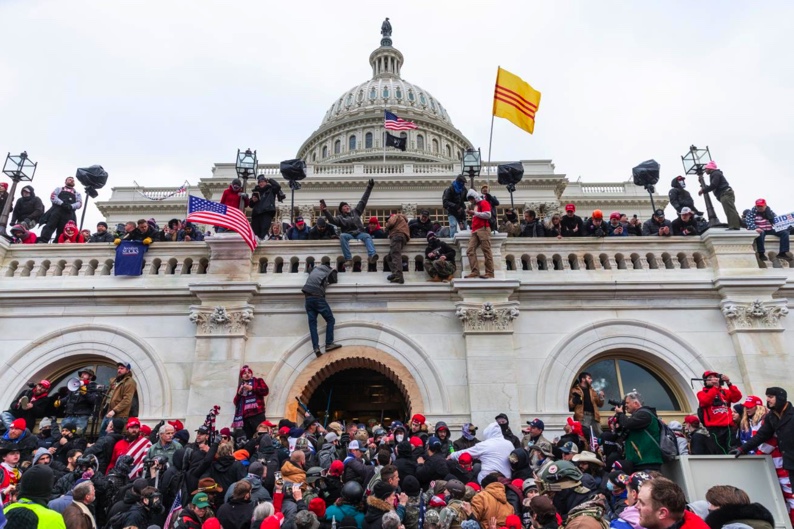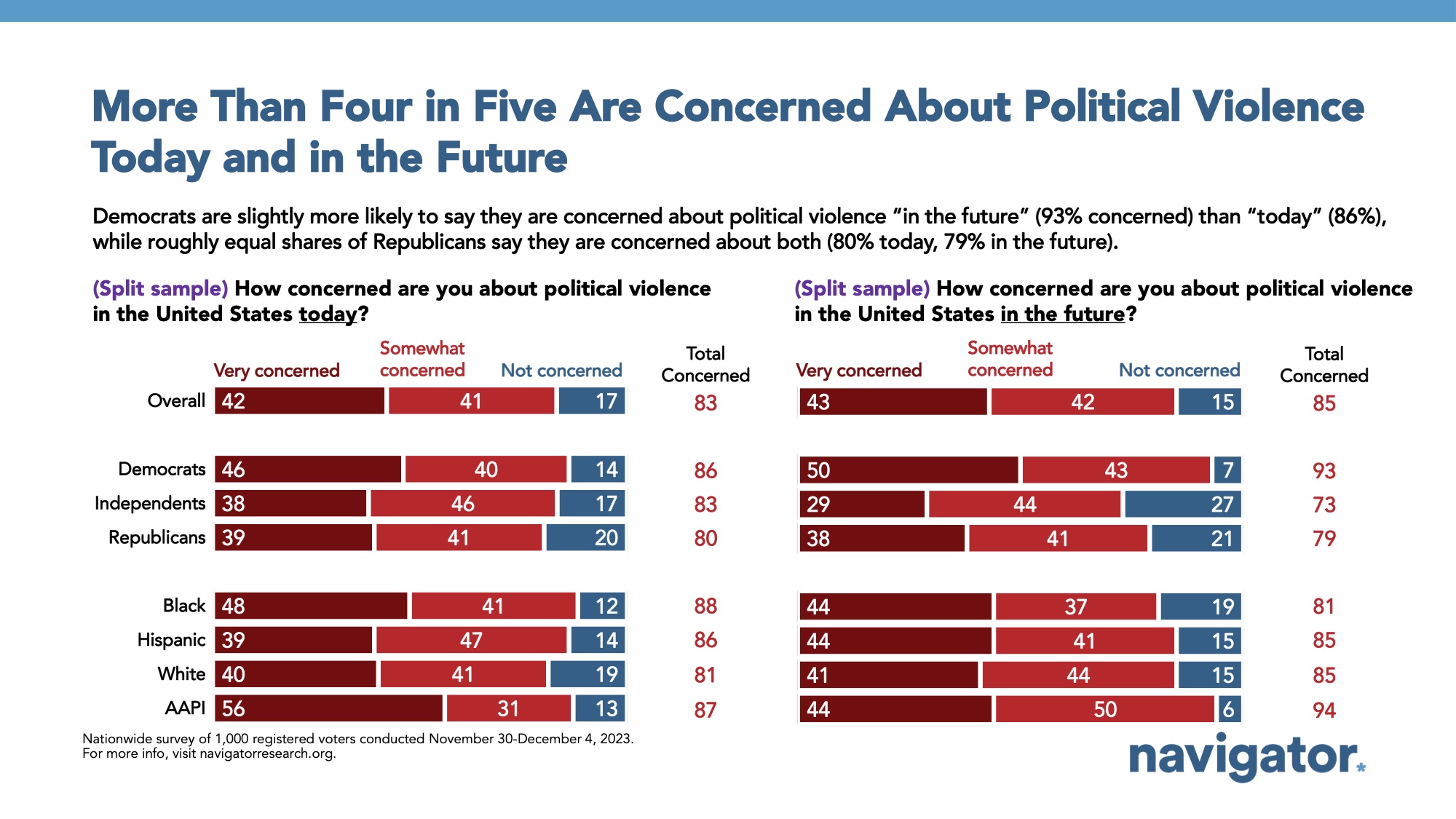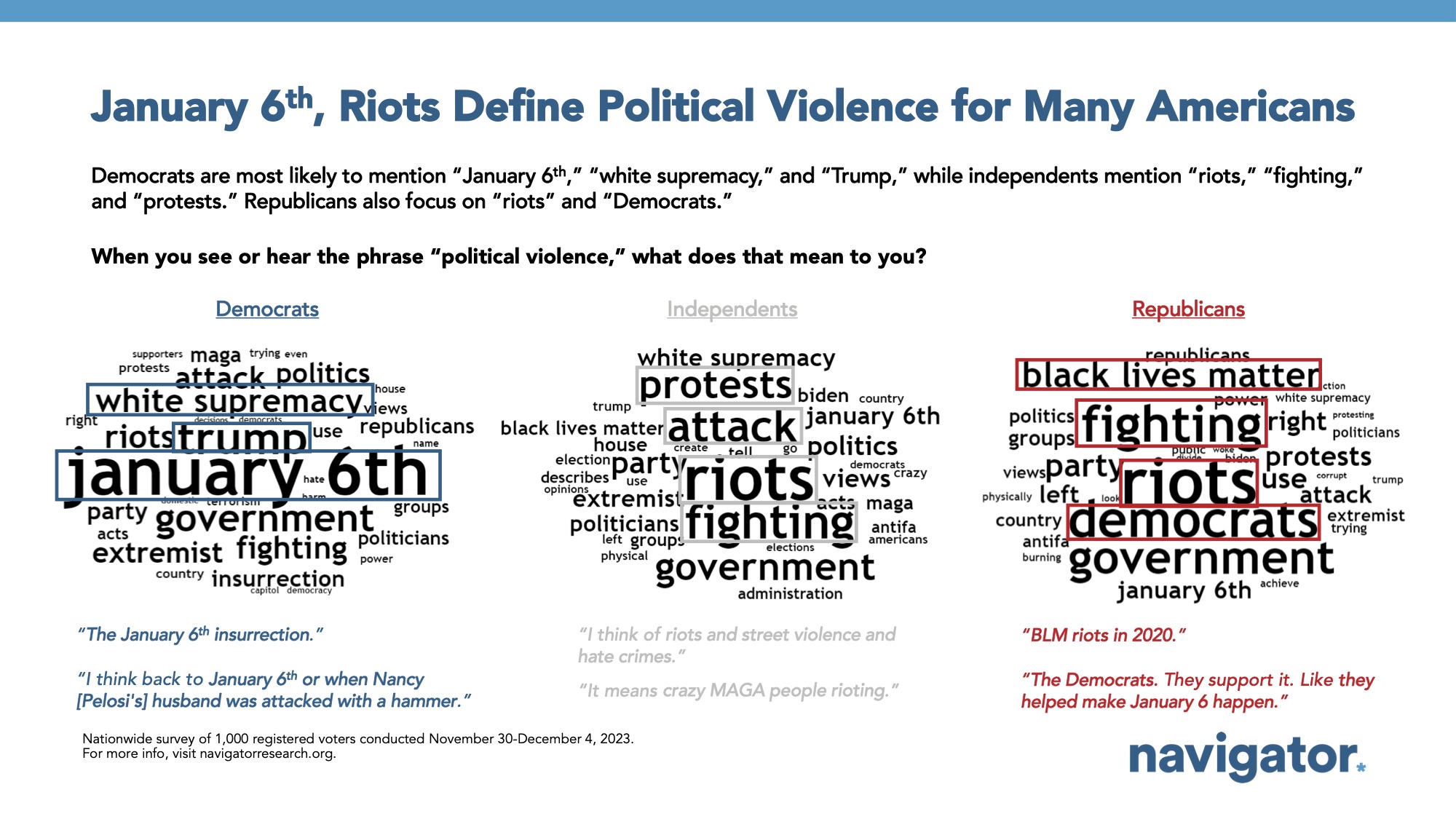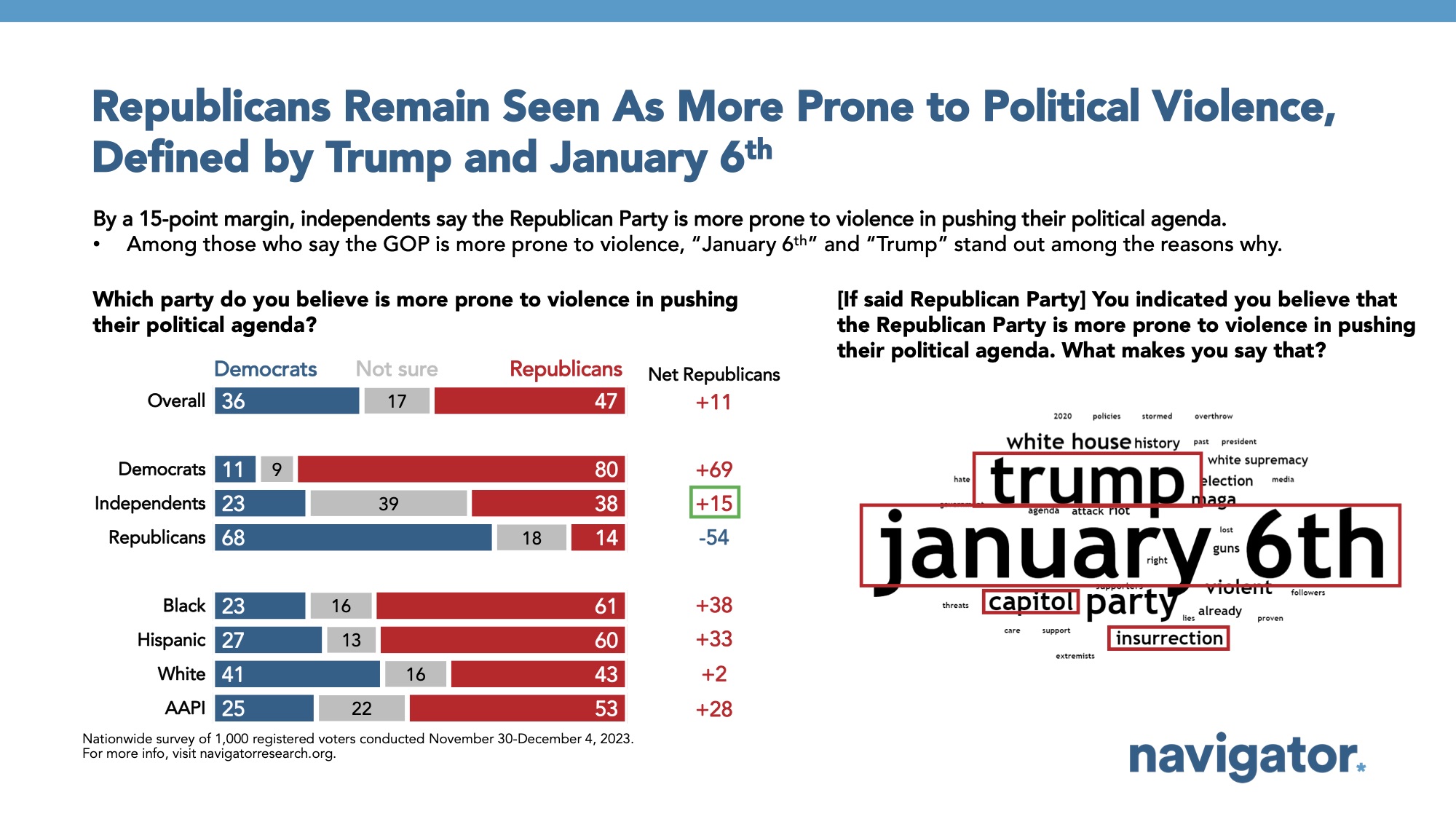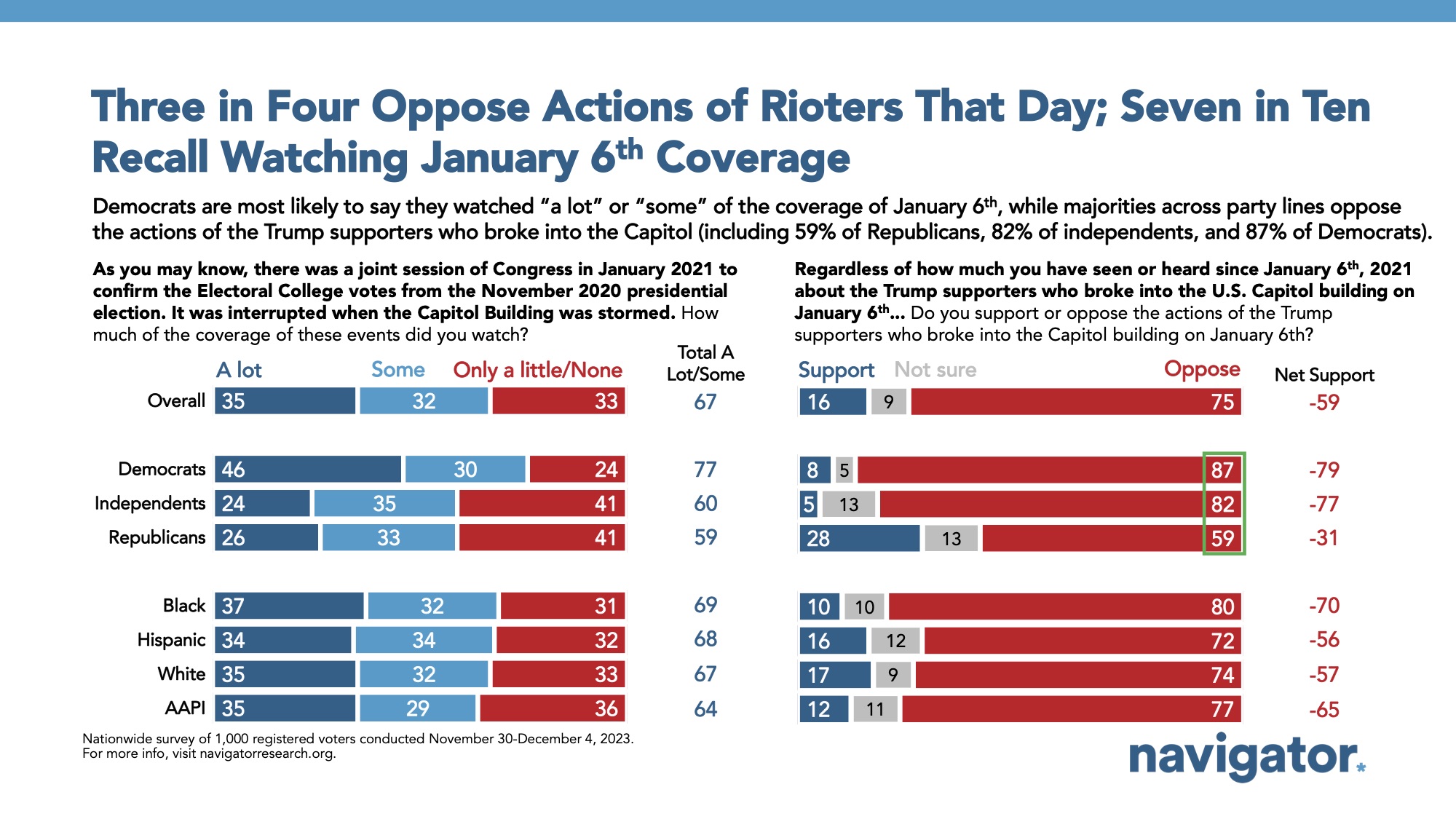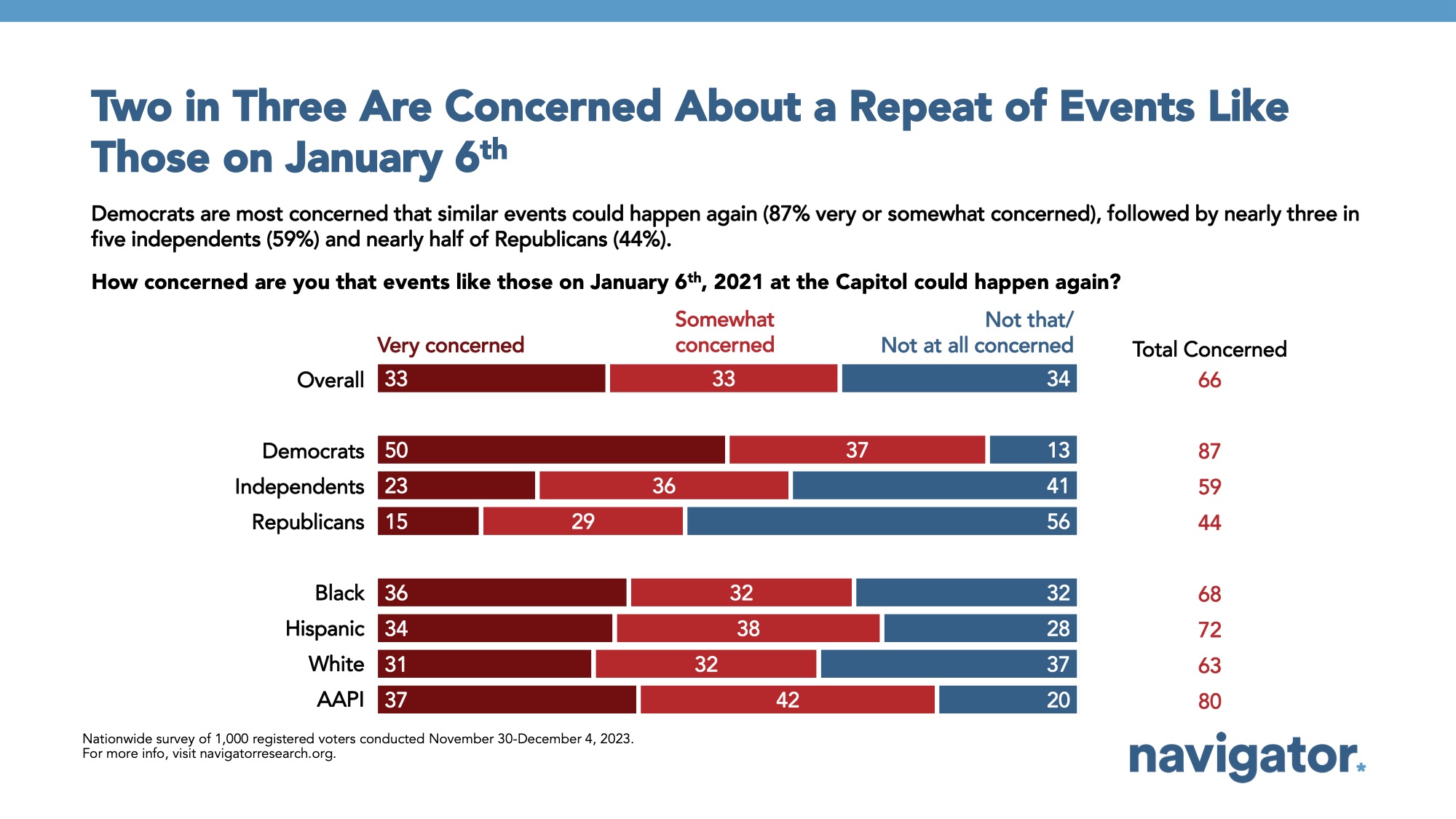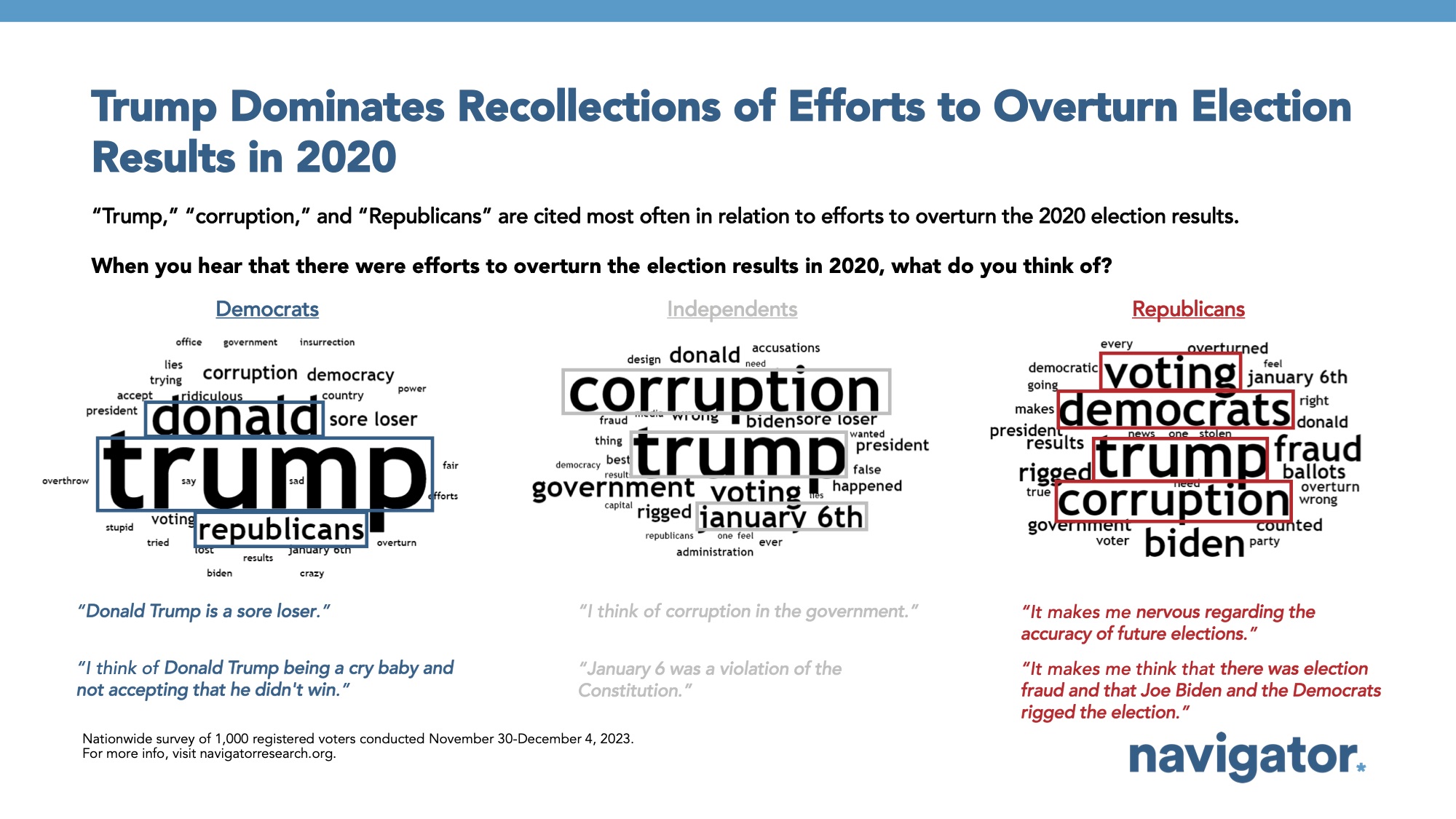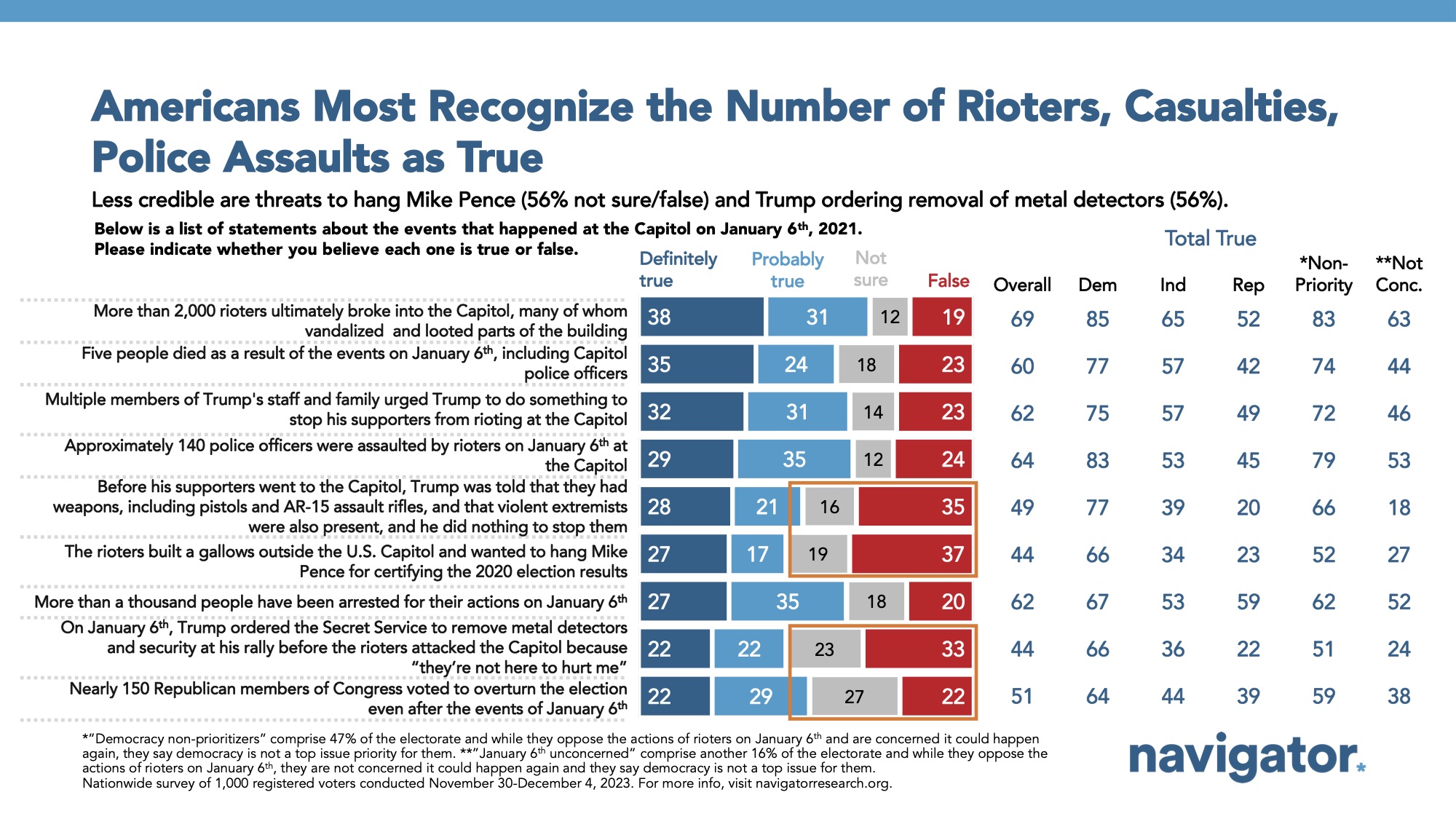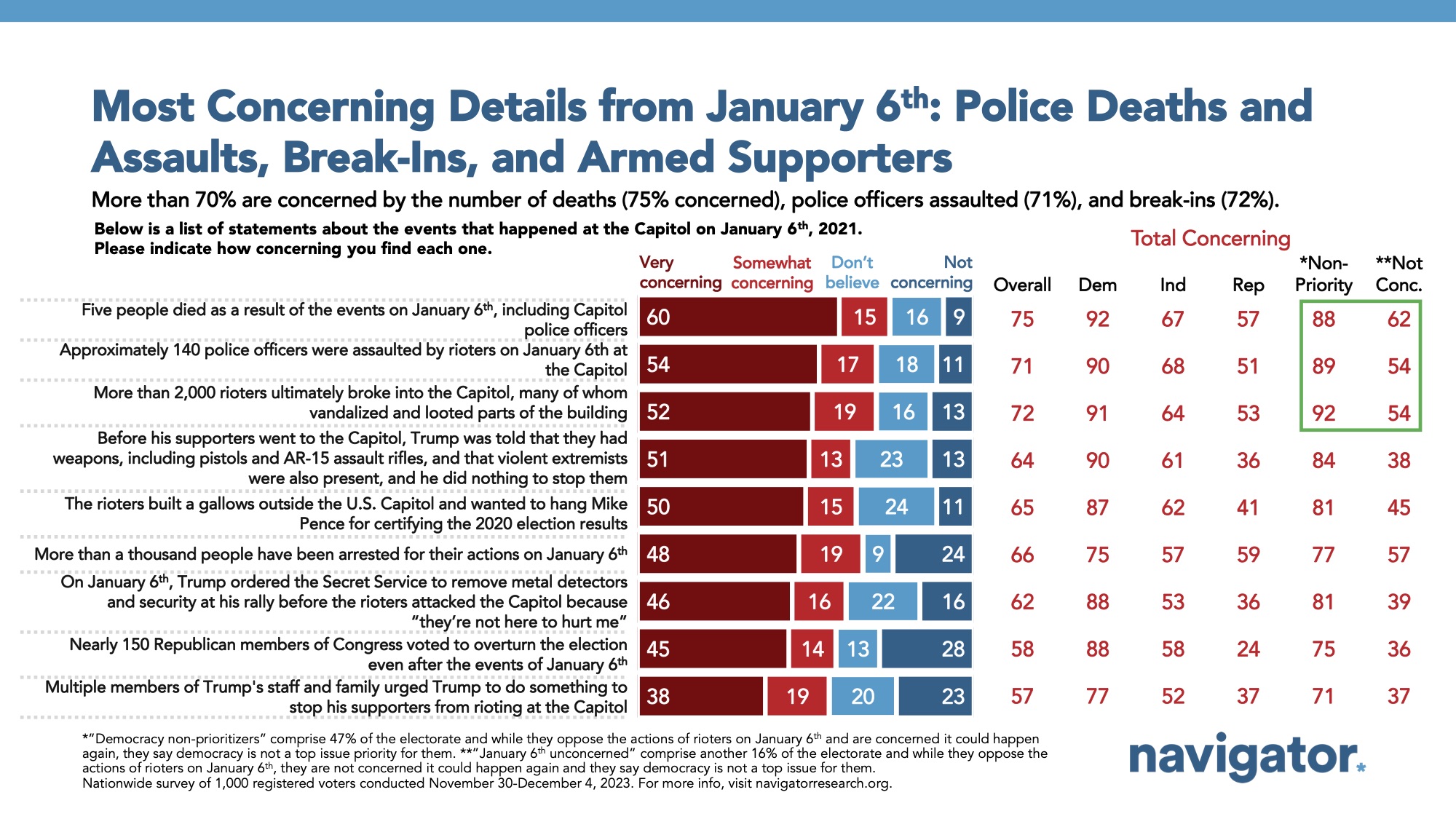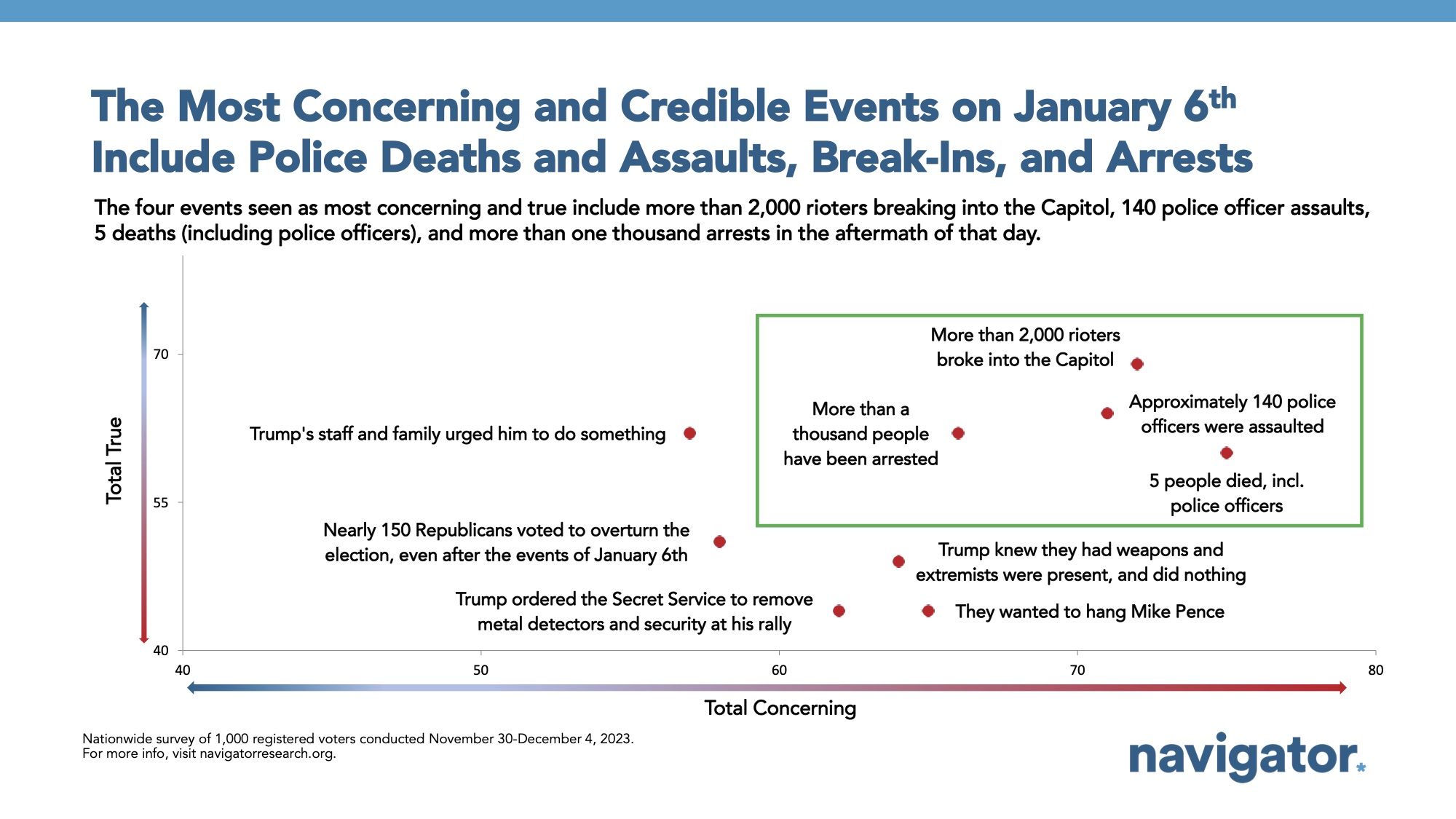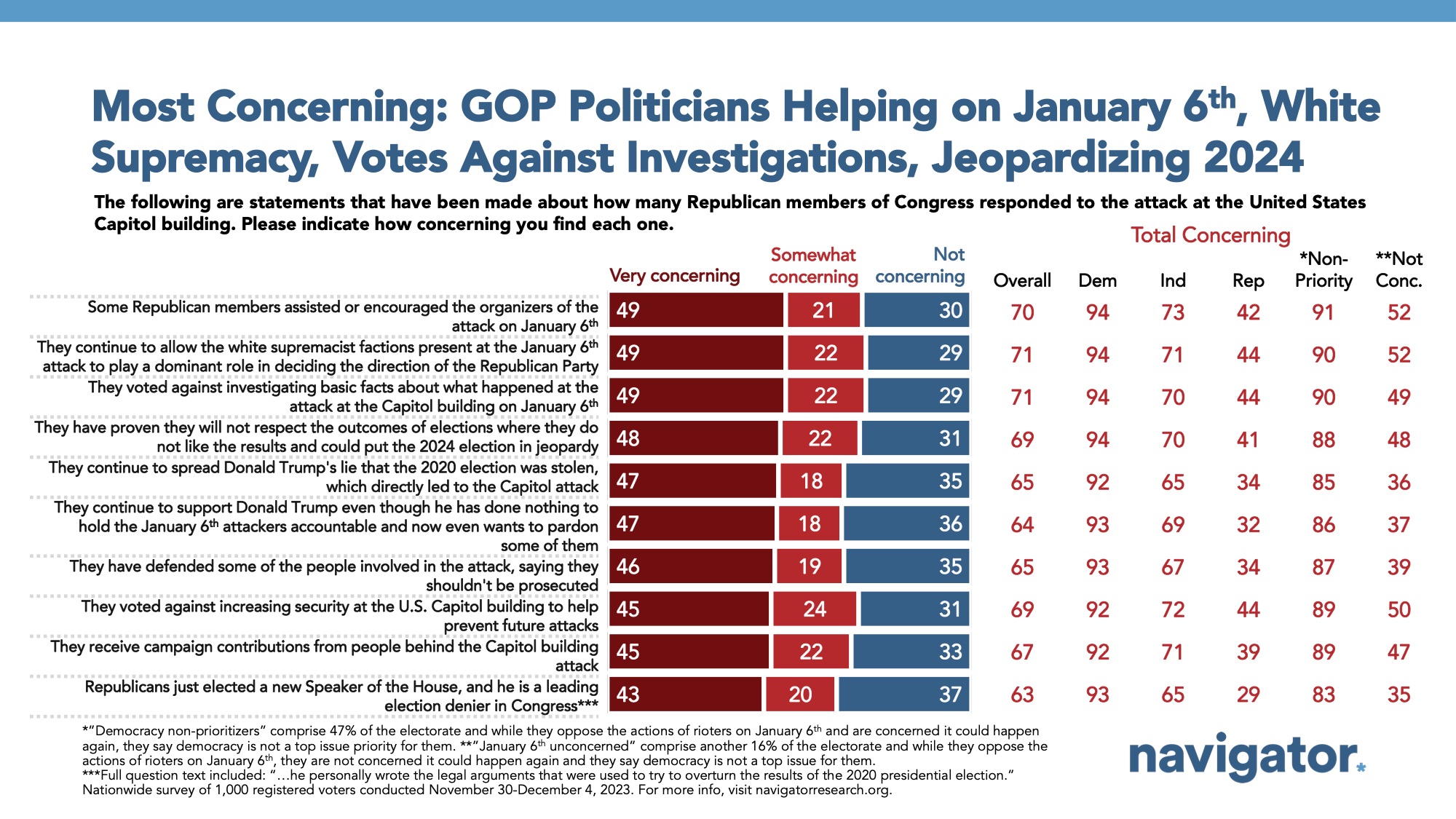Poll: Political Violence and January 6th
This Navigator Research report contains polling data on Americans’ perceptions of political violence in the United States, including the level of concern about political violence now and in the future, the most concerning and credible statements about the January 6th insurrection, and what Americans view as the most concerning responses from Republicans in Congress to January 6th.
Across party lines, at least four in five Americans are concerned about political violence in the United States today.
83 percent of Americans are concerned about political violence, a plurality of whom are “very” concerned (42 percent). Concern is felt strongly across partisanship, including among more than four in five Democrats (86 percent), independents (83 percent), and Republicans (80 percent). A similar share of Americans are concerned about political violence in the United States in the future (85 percent), with a greater share of Democrats (93 percent concerned, 50 percent “very” concerned) than independents (73 percent concerned, 38 percent “very” concerned) and Republicans (79 percent concerned, 29 percent “very” concerned).
- When asked what “political violence” meant, Democrats most often cited “January 6th” and “Trump,” independents cited “attacks,” “protests,” “riots,” and “fighting,” and Republicans frequently cited “fighting,” “riots,” “Democrats,” and “Black Lives Matter.”
People believe the Republican Party is more inclined to use violence than the Democratic Party.
By an 11-point margin, more Americans believe the Republican Party is more prone to violence in pushing their agenda than the Democratic Party (47 percent Republicans – 36 percent Democrats – 17 percent not sure), including by a 15-point margin among independents (38 percent Republicans – 23 percent Democrats – 39 percent not sure). “Trump” and “January 6th” are the most frequently cited factors for those who feel the Republican Party is more prone to violence in pushing their agenda.
Two in three Americans are concerned the events of January 6th could happen again.
Three in four Americans oppose the actions of the Trump supporters who attacked the Capitol on January 6th, as two in three are concerned it could happen again. By a 59-point margin, three in four oppose the actions of the Trump supporters who broke into the Capitol building on January 6th (16 percent support – 75 percent oppose), including nearly nine in ten Democrats (87 percent), four in five independents (82 percent), and three in five Republicans (59 percent), with higher levels of opposition among those who do not identify as MAGA Republicans (72 percent) compared to Republicans who do identify with the MAGA movement (47 percent).
- Two in three Americans are concerned that events like those on January 6th at the Capitol could happen again (net +32; 66 percent concerned – 34 percent not concerned) with one in three who are “very” concerned (33 percent). Across partisanship, concern is primarily driven by Democrats (87 percent), but also includes three in five independents (59 percent) and nearly half of Republicans (net -12; 44 percent concerned – 56 percent not concerned) who feel the same.
The most concerning and credible events on January 6th are the death of police, assaults, break-ins, and the number of arrests.
The statements found to be the most true and concerning included that “more than 2,000 rioters ultimately broke into the Capitol, many of whom vandalized and looted parts of the building” (69 percent true, 72 percent concerning), that “approximately 140 police officers were assaulted by rioters” (64 percent true, 71 percent concerning), that “five people died as a result of the events on January 6th, including Capitol police officers” (60 percent true, 75 percent concerning), and that “more than a thousand people have been arrested for their actions on January 6th” (62 percent true, 66 percent concerning).
Americans have concerns about Congressional Republicans’ response to the January 6th attack.
The most concerning statements about Republicans in Congress’ response to the attack are about assisting or encouraging the attack, propping up white supremacist factions, and voting against investigating basic facts of what happened that day. Seven in ten Americans find it concerning that Republicans in Congress “continue to allow the white supremacist factions present at the January 6th attack to play a dominant role in deciding the direction of the Republican Party” (71 percent concerning, including 71 percent of independents), that “they voted against investigating basic facts about what happened at the attack at the Capitol building on January 6th “(71 percent concerning, including 70 percent of independents), and that “some Republican members assisted or encouraged the organizers of the attack on January 6th (70 percent concerning, including 73 percent of independents). Other top concerning statements about how some Republicans in Congress responded to January 6th include that:
- They have proven they will not respect the outcomes of the election where they do not like the results and could put the 2024 election in jeopardy (69 percent concerning, including 70 percent of independents); and,
- They continue to spread Donald Trump’s lie that the 2020 election was stolen, which directly led to the Capitol attack (65 percent concerning, including 65 percent of independents).
